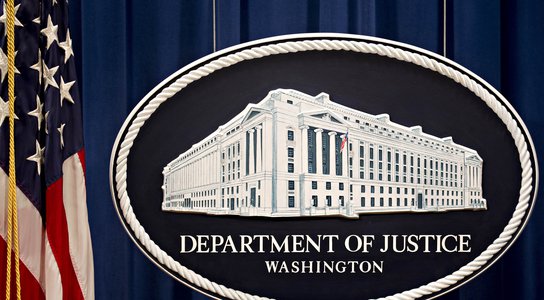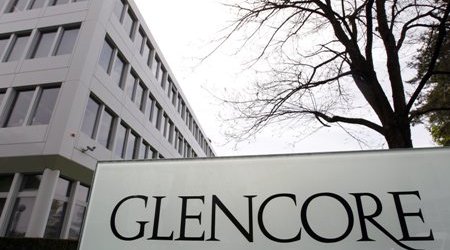It is no secret that the global commodities trading sector is rife with corruption risks. We at Global Witness have been investigating this for years, and have seen enforcement efforts fall short all too often. So we are pleased to see the chief U.S. commodities regulator, the Commodities and Futures Trading Commission (CFTC), start paying more attention to foreign corrupt practices.
We welcomed their first such public investigation, into Glencore’s potentially corrupt practices in the Democratic Republic of Congo and other countries. This move comes amid heightened scrutiny of the sector: the world’s five biggest oil traders -- Glencore, Gunvor, Mercuria, Trafigura and Vitol -- are all currently facing corruption investigations in one or more jurisdictions, including not only the United States but also Brazil and Switzerland.
In investigating foreign bribery, the CFTC is joining other U.S. government agencies: the Department of Justice (DOJ) and Securities and Exchange Commission (SEC), both with a long track record pursuing violations of the Foreign Corrupt Practices Act (FCPA) by commodities traders. In July last year the DOJ issued a subsidiary of Glencore with a subpoena, demanding materials related to the company’s business in the DRC, Nigeria and Venezuela.
The DOJ’s interest in Glencore’s DRC deals likely relates to its decade-long partnership with Dan Gertler, a controversial middleman close to the DRC’s president from 2001 to 2019. In December 2017 the U.S. Department of Treasury sanctioned Gertler for “opaque and corrupt mining and oil deals” in the DRC. Earlier that year, a subsidiary of the hedge fund Och-Ziff Capital Management Group pleaded guilty to a bribery conspiracy as part of an FCPA enforcement action investigated by the DOJ and SEC, a significant part of which related to Och-Ziff’s partnership with Gertler. We have pioneered reporting on Glencore’s suspect deals with Gertler since 2011. Both Glencore and Gertler have denied wrongdoing in their DRC deals.
Some observers have questioned whether we really need another U.S. government agency enforcing anticorruption laws. We think that a reinforcement is welcome, particularly at a time when the DOJ is coming under increasing criticism for its weak enforcement of the FCPA. Indeed, concerns that the CFTC would merely pile on existing FCPA cases were anticipated in a speech by the CFTC director of enforcement James McDonald announcing the new policy earlier this year. He recognized that corrupt practices are subject to FCPA prosecution and pledged to work closely with enforcement partners at the SEC and DOJ. So far, the only public information about CFTC’s case against Glencore comes from the company’s own terse disclosure but there is no doubt that this case will set an important precedent that will be watched closely.
It is too early to tell what the CFTC’s anti corruption role will be in practice, but as a legal matter, it is clear that the CFTC has a different, complementary role to play given its different legal mandate and expertise. Rather than prosecute the FCPA (which the CFTC does not have the legal authority to do), they can pursue foreign corrupt practices that violate U.S. commodities laws. In particular, if the bribery impacted, or was intended to impact, the commodity price, that might constitute market manipulation or false reporting under the Commodity Exchange Act.
For example, Glencore, together with several other major commodities traders, was implicated in an oil price manipulation scheme related to the Car Wash scandal in Brazil, as we previously reported. Oil price manipulation might also be a part of the CFTC’s investigation of Glencore’s oil trading activities in Venezuela and Nigeria. The CFTC can also bring fraud cases where investors’ funds are misused to pay bribes. The ongoing investigation of Glencore illustrates that corruption risk at any level can be extremely costly to investors: following news of the DOJ’s subpoena last summer, Glencore’s stock plunged 13 percent, losing $8.8 billion in value.
Most of the major commodities traders are also subject to Swiss law because many of them, including Glencore, Vitol, Trafigura and others, are headquartered in Switzerland. The Swiss government can and should do more to contribute to the global fight against corruption in the commodities trading sector. In its most recent evaluation of Switzerland’s implementation of the Anti-Bribery Convention last year, the Organization for Economic Cooperation and Development (OECD) pointed out that the Swiss authorities should take action that includes more sustained enforcement and measures to prevent foreign bribery in high-risk sectors, particularly singling out the commodities trading sector.
This is not just an issue for the Swiss, however. These companies are sprawling multinationals operating across the planet; it is vital that laws are enforced in several key jurisdictions. Glencore, for example, is headquartered in Switzerland but listed on the London Stock Exchange and is reliant on U.S. dollars for many transactions. Agencies in the United States, the UK and elsewhere must weigh in on the fight to counter corruption in the commodities sector. We applaud and support the CFTC’s efforts and hope its decision to ramp up anti-corruption enforcement will have positive spillovers and incentivize other regulatory agencies worldwide to do the same.
Originally published on the FCPA blog, 23 May 2019.


